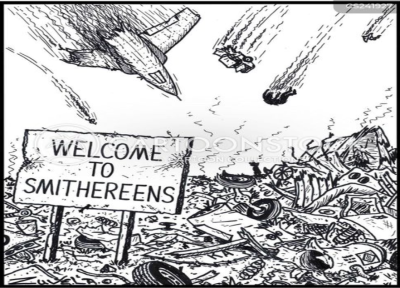The Pandemic Invades The Developing World

One of the oddities of the coronavirus pandemic has been its apparent preference for rich countries.
The reason is thought to be that most developing countries are in warmer climes, and viruses don’t spread as readily in heat and humidity (which is why flu season in the US begins in the Fall and ends in Spring).
But the developing world’s reprieve may turn out to be temporary. From yesterday’s Wall Street Journal:
CARACAS, Venezuela—The coronavirus has overwhelmed health-care systems in a number of highly developed nations. Now, it is spreading to some of the world’s most vulnerable countries, with health officials in Africa and Latin America fearing the impact will be devastating.
At least 26 of Africa’s 54 countries have confirmed cases. The prospect of a mass outbreak is particularly alarming for a region with a shortage of some 1.8 million health workers that is already suffering the world’s largest disease burden, according to the World Health Organization. In 2018, an estimated 470,000 people in sub-Saharan Africa died from AIDS-related causes alone, according to the United Nations.
Sudan is among more than a dozen nations in Africa that lacked capacity to test for the virus until early March, according to WHO. Its first case of the virus was only identified on Friday, a day after the victim, a man in his 50s, died after returning from the United Arab Emirates, Sudan’s health ministry said.
In West Africa, Guinea has been beset by months of violent street protests by the political opposition, upending the government’s ability to provide services. There, the first case of coronavirus was detected Thursday after a European Union employee who had arrived asked to be tested.
South African President Cyril Ramaphosa addressed the nation late Sunday, calling the pandemic a national emergency and saying his government was working on an economic rescue package to limit the “severe disruption” to the economy. South Africa has 61 confirmed cases.
Africa is the world’s second most-populous continent and accounts for 16% of the global population—but just 1% of health-care spending. Health officials have said there is little money for new ventilators and other life-support equipment needed for severe cases of the virus that could divert resources away from other diseases that kill hundreds of thousands every year.
“Africa, especially sub-Saharan Africa, is ill-equipped and unprepared to manage outbreaks of the magnitude like coronavirus,” said Dr. Chris Kaganda, a Ugandan public-health specialist. “There is insufficient equipment for early detection of the disease, inadequate personnel with the appropriate knowledge and skills to treat patients infected with coronavirus. The perennial low immunity due to malnutrition and other diseases such as HIV/AIDS may compound the transmission and fatality.”
Latin America and the Caribbean, a richer region with many middle-income countries, has strong health care in a number of places. Colombia will require people arriving to the country to go into a two-week quarantine. Peru and Argentina on Sunday sealed off their borders. Peru also restricted movement within the country, allowing only essential services like supermarkets, banks and pharmacies to remain open.
Yet weak health-care systems abound in countries as varied as Haiti, which recently reported its first coronavirus case, to Guyana on South America’s eastern shoulder to Honduras in Central America, which is hard hit by drug trafficking.
Honduras is particularly hamstrung by corruption, which costs some $2 billion a year, equivalent to about 10% of gross domestic product, said Ismael Zepeda, an economist at Fosdeh, a think tank. That undercuts already decaying public services, experts say.
Few countries are as poorly prepared to handle an onslaught of cases as Venezuela, which reported its first two cases Friday and 15 more over the weekend. The government has banned flights from Europe and Colombia, and ordered businesses to close and people to remain at home in six states and the capital. Venezuelan doctors and epidemiologists have been warning for years about the inability of the health system to fight epidemics that have hit the country, including dengue, yellow fever and malaria.
Hospitals have lost thousands of highly-trained doctors and nurses who have fled abroad, part of an exodus of some 4.5 million migrants fleeing an authoritarian regime. Many hospitals lack power, often being plunged into darkness during blackouts that force surgeons to finish operations using the light on their cellphones. About 90% of hospitals reported having intermittent or no running water last year, while half of emergency rooms aren’t equipped with face masks, according to a national survey of Venezuela’s biggest hospitals conducted by a network of health professionals.
“Whatever the impact is going to be in other countries, it is going to be bigger in Venezuela,” said Dr. Julio Castro, a prominent university professor and infectious disease specialist in Caracas who recently saw patients with symptoms of the coronavirus. “When you have this kind of situation in a country, you need more basic resources and we don’t have them.”
Medical authorities in Venezuela fear that the government might not be able to get an accurate gauge of the coronavirus’s spread or might try to muzzle doctors, as it has in the past with arrests and firings of those who speak to journalists. Dr. Jose Manuel Olivares, an oncologist and opposition congressman who fled the country last year, said medical professionals are wary about issuing warnings.
“It’s better to say you don’t have any cases of corona, even if you have your suspicions,” said Mr. Olivares, who is in contact with colleagues in Venezuela. “Call it a cold, another flu, or H1N1, anything but corona.”
To summarize, statistics coming from many developing countries can’t be trusted because they lack the means and/or the will to test their people. And if the pandemic does begin to spread in Latin America and Africa as it’s spreading in the US and Europe, the most likely result is economic and political chaos and border issues that make the past few years look, in retrospect, like the eye of the storm.



